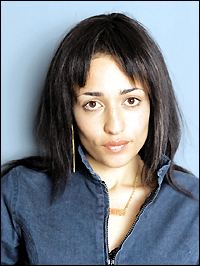 Black British author Zadie Smith recently won the prestigious Orange Prize and was shortlisted for the even more prestigious 2005 Man Booker Prize for her novel On Beauty. Smith's debut novel, White Teeth, was a publishing phenomenon and critical success in 2001. It was made into a BBC television miniseries.
Black British author Zadie Smith recently won the prestigious Orange Prize and was shortlisted for the even more prestigious 2005 Man Booker Prize for her novel On Beauty. Smith's debut novel, White Teeth, was a publishing phenomenon and critical success in 2001. It was made into a BBC television miniseries.She is a somewhat controversial figure in some circles because her books have sold so well and been so prominent. I didn't read White Teeth but I saw the mini-series made from it. I completely missed her sophomore work The Autograph Man. I had heard that On Beauty is based in a small East Coast liberal arts college and features campus politics extensively as well as the politics of race, multiculturalism and liberalism so I was excited to read it.
My friend Leo lent me his copy for my trip to San Juan, Puerto Rico in early May. I quite enjoyed this novel.
The most salient parts for me were, not unsurprisingly, the detailed descriptions of campus life at Wellington, the fictional liberal arts college which most observers say is modelled after the author's stay at Harvard during the 2002-2003 academic year. The faculty meetings, the internal musings of the students (and the faculty) on the first day of class, the psychology of the Dean were resoundingly accurate, to me. A bonus feature was the West Indian background of some of the main characters. Since I was born in the West Indies myself, and very rarely see diasporic portrayals of Blackness in the fiction I read, this was a special treat. I think the last Caribbean-inflected novel I read was by Nalo Hopkinson. If any of the MadProfessah audience has suggestions for other Black/West Indian/Caribbean novels please don't hesitate to suggest them to me!
The plot of the book follows the unravelling of the family life of the patriarch and art history professor Howard Belsey in the aftermath of his recent unfaithfulness to his wife Kiki Belsey. Howard is tall, white and thin; Kiki is short, black and fat. They have two off-spring: Zora, 18 and attending Howard's place of employ ("Wellington") and Levi, 16. As with most of Smith's work, the socio-cultural ramifications of race and ethnicity centered around the specific experience of multiracial and multicultural actors (characters, in a literary context) are the real raison d'etre of the book. Some critics diss Zadie Smith's ability to tell a decent story--she's really more interested in exploring the ideas emanating from and implicated in her characters' plights--but I kept reading the book, fueled by curiosity as to what would happen to these characters. The end is a bit sudden and oblique, but doesn't detract from the sense of satisfaction of having spent a good deal of time with characters that you now feel intimately connected to --and that, after all, is the best one can hope for when one picks up a book. "Phew, I did not waste my time reading this book."
REVIEW: A.
